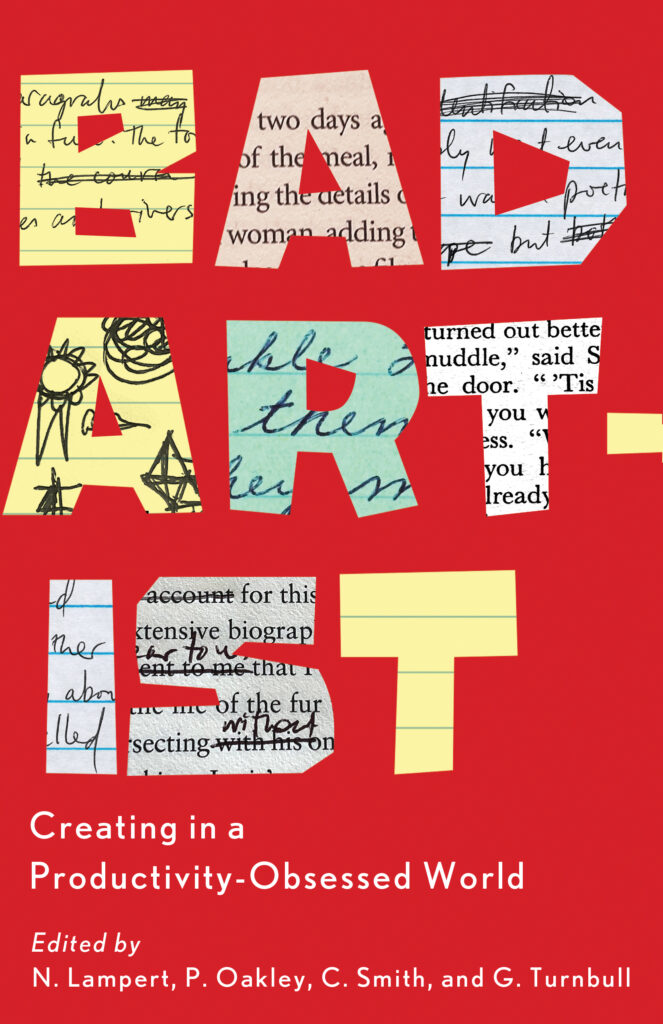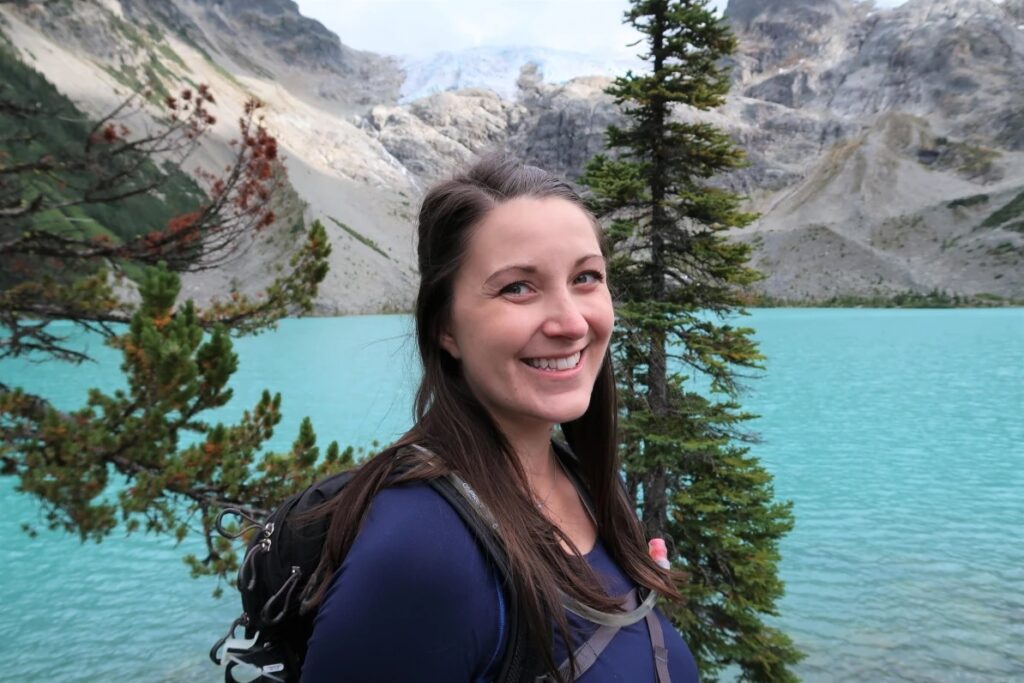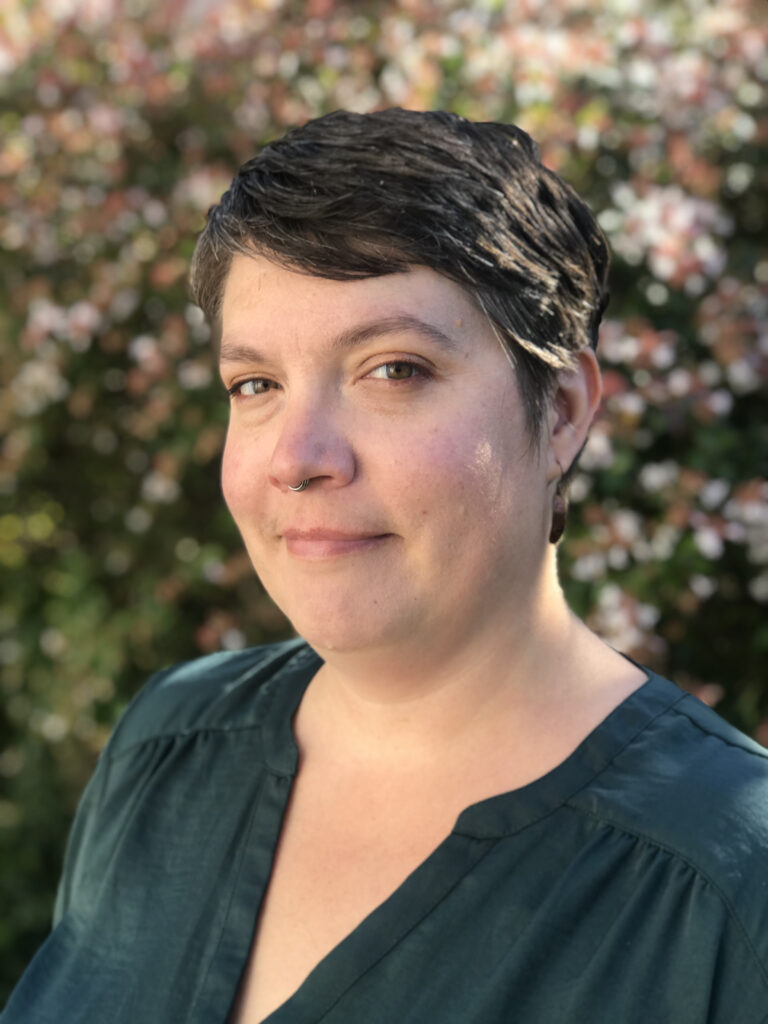Creatives: look after yourselves
Bad Artist: Creating in a Productivity-Obsessed World
by Nellwyn Lampert, Pamela Oakley, Christian Smith, Gillian Turnbull (eds.)
Victoria: TouchWood Editions, 2024
$24 / 9781990071256
Reviewed by Jeffrey Stychin
*

As I sit down to write this review, after absorbing the words of each chapter and the authors’ stories of creativity, in a world consumed by capitalist pressures and nuanced problems of drudgery, I’m keenly aware of my own flaws and self-imposed setbacks and outlooks on achievable prose. I relate so fondly to these wonderfully crafted voices rallying together to tell the world of writers that they are enough in a world so toxic and troubled. The truth seems muddled amongst their stoic and strong voices seemingly shouting out from these pages.
I would consider myself a very casual writer, someone who dabbled in freelance journalism, writing music reviews, interviewing artists, and attending university art shows. I am now being graciously allowed to review books of all kinds as I’m doing today and although I wish for more, this routine fits quite seamlessly into my own chaotic world, between navigating my career, relationships, and family.

This is a wildly wonderful collection of the work of individual writers who all strive to share their experiences with the creative process. Whether that is their day-to-day routines, some personal challenges and struggles to overcome, or the ways they navigate busy lives and crisis while still finding time to do what they love creatively in whatever way and time they find possible. I found each entry extremely charming, allowing me to see into the lives of other people who share similar passions and a willingness to sustain art in its purest and simplest form, unique to each of them. There is immense solace in reading what others go through, to help you along whatever bumpy, unpaved road you’re currently traversing. In knowing more people are also on a path of figuring it all out at the same time.
One of the main features of these entries is to remind you as an artist to maintain some version of self-care and make sure you protect what creativity and drive for your art that you can: to be safe with it, protect it, and nourish it.
In that spirit of “I can do it,” I have to put off rest, and care, and healing. I have tried to prove myself worthy by what I can take, by how much I can suffer, by how far I will go—certainly not by how well I write, and definitely not by how well I can take care of myself. And by doing all this, I have learned a pretty nasty truth; the more you endure, the more you will be asked to endure. (p.26)
I love this passage, written by Stacy May Fowles, and I definitely resonate with how sincere it is in regards to not putting your personal needs first. Amongst the chaos of the current world, I believe now, more than ever, healing starts from within and only then can it permeate out.

Another main point a lot of the writers share in this collection is the seemingly inescapable trap of capitalism and how it relates to validation of art in all its forms.
Even though many find success in their art through monetary notoriety, that does not mean it’s the right or only way to seek your pleasure and happiness. From creating, from output or what you deem productive and successful.
If economists sat down and evaluated my energy input versus my successful output, they’d have questions about my productivity. It’s here where many of us creatives get stuck. We want to be successful and the definition of success, which is framed by capitalism and productivity, doesn’t align with creativity. (p.39)
This passage was written by Megan Cole of Powell River. It perfectly illustrates the trap of producing for the sake of producing, not creating for the sake of creating. I would imagine this anthology as your new toolkit in a healthy pursuit towards your artistic natures. If anyone reading this is an artist at heart, I urge you to remember to think of the process as something you care about deeply.
Whatever is going on around me isn’t getting in the way; it is the Way. I practise foresight, insight, and hindsight. This is not accounting “for” myself, or even “to” myself, but attending to the self and what she needs to do next. I go for walks. I read, I journal, I observe my daily routine, discover my process, how I dip in and out. I learn not to give myself a hard time, recognizing that I am tending the seed when I am not interfering with the soil. (p.57)
This was written by Nicola Perry, and this passage encapsulates exactly what I want to illustrate to you, that the protection of your process is most important.
The more you read through Bad Artist, the more you realize how many wonderfully helpful insights are filled in its pages as these authors come together in a fight to protect what they love most. Sometimes, it makes sense for me to let the writers here speak and show you the reader some insights into this complex process.
We’re often told as writers that we must push through resistance and blocks at all costs, but trying to push an injured brain or punishing myself for non-performance seems counterproductive and damaging. So, I don’t push. I pace. I don’t focus on what my hyped-up writing self thinks I should do. Instead, I reshuffle the cards to find some movement – any movement – forward. (p.69)

Linda Browne makes a great point here that sometimes empathy towards yourself is more important than meeting a deadline or forcing yourself to a breaking point.
Although there is a plethora of knowledge in positivity, there is also the same in the pitfalls and things to be wary of when it comes to the artist creative process, as Dr. Jess Mannion states:
Interest yields hyper-focus and productivity, but disinterest causes procrastination and a lack of intended results. (p.99)
While reading through this collection, you’re introduced to such starkly honest advice and words of wisdom, encouragement, and perseverance. You feel comforted on all sides of this journey not only in art, but in life and how to navigate through to better, happier, and a more understood sense of self and well-being.
As an artistic person fallow ground was akin to self-doubt and creative droughts. All of which I resisted welcoming. I didn’t understand it was nourishment. (p.106)
Jessica Payne makes the last point I’ll mention here, on how time away sometimes is time for healing. Although art is beautiful and ugly all at the same time, we all can step back, climb down, retreat, take a long break, or a short one.
Whatever we need, whenever we need it: we must recognize we’re all human, we all struggle. We must remind ourselves of this and support others in this beautiful pursuit of being an artist. Check out this wild ride read and get inspired.
*

Jeffrey Stychin studied verse and poetry through music and art. He began writing as a means of catharsis and as a way to communicate with himself and others. A Vancouver barber by day, a poet by night, he currently resides with his thoughts and dreams in a quiet place full of trees. [Editor’s note: Jeffrey Stychin has recently reviewed books by Jill Payne, Nathan Hellner-Mestelman, Lisa Hartley, Colin Upton, Darren Groth, and Earle Peach for The British Columbia Review.]
*
The British Columbia Review
Interim Editors, 2023-26: Trevor Marc Hughes (non-fiction), Brett Josef Grubisic (fiction)
Publisher: Richard Mackie
Formerly The Ormsby Review, The British Columbia Review is an on-line book review and journal service for BC writers and readers. The Advisory Board now consists of Jean Barman, Wade Davis, Robin Fisher, Barry Gough, Hugh Johnston, Kathy Mezei, Patricia Roy, and Graeme Wynn. Provincial Government Patron (since September 2018): Creative BC. Honorary Patron: Yosef Wosk. Scholarly Patron: SFU Graduate Liberal Studies. The British Columbia Review was founded in 2016 by Richard Mackie and Alan Twigg.
“Only connect.” – E.M. Forster
One comment on “Creatives: look after yourselves”
Excellent review of a fascinating book dealing with creativity in art forms, in this case writing, prose or poetry, in the context of the acquired & ingrained measurable value or success in capitalistic parameters.